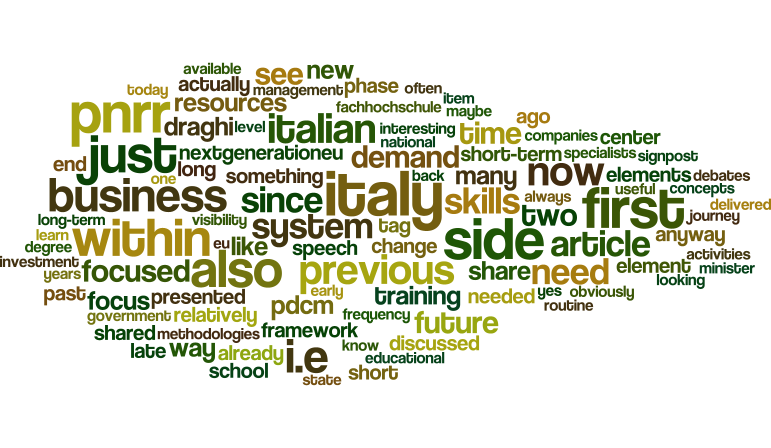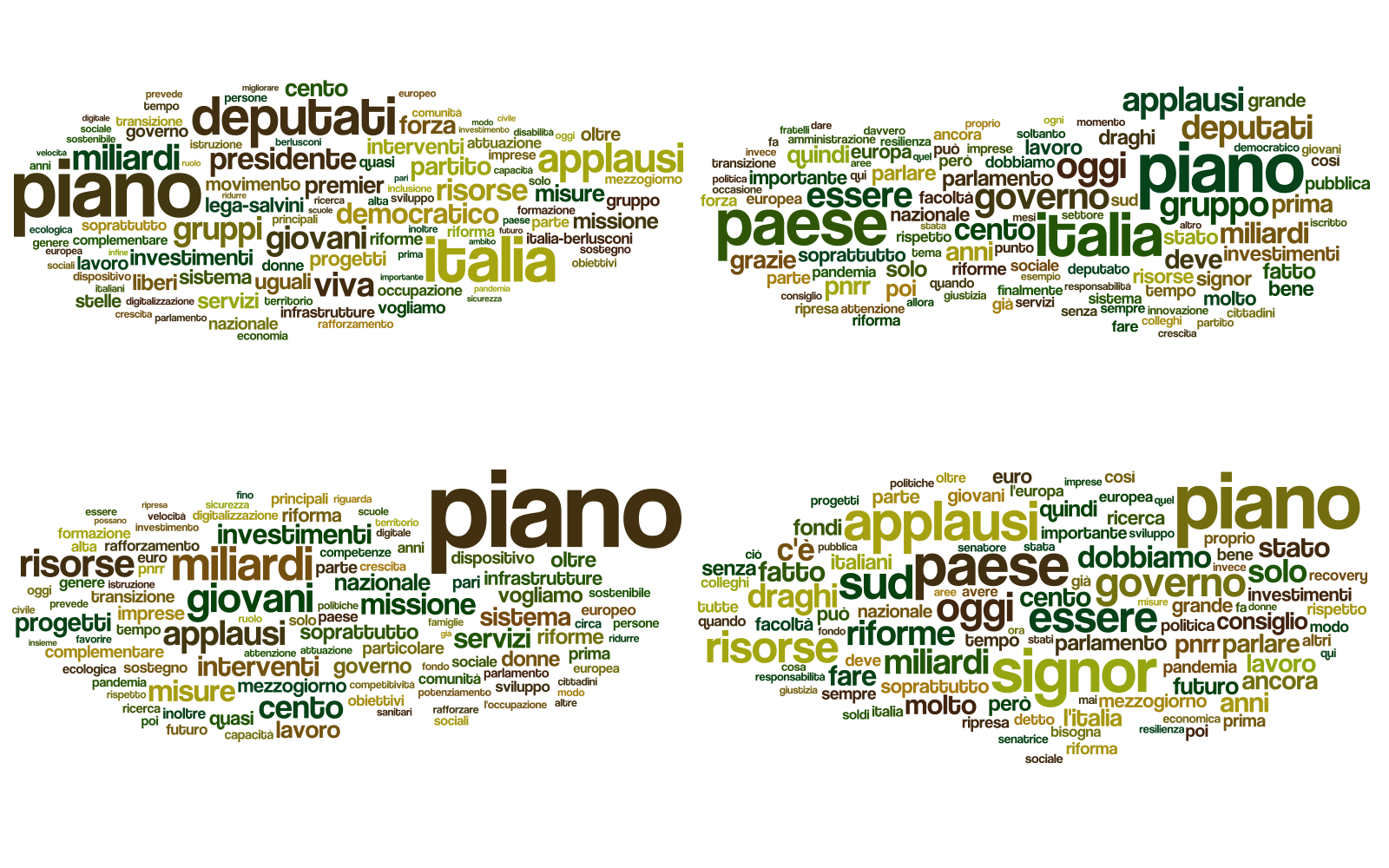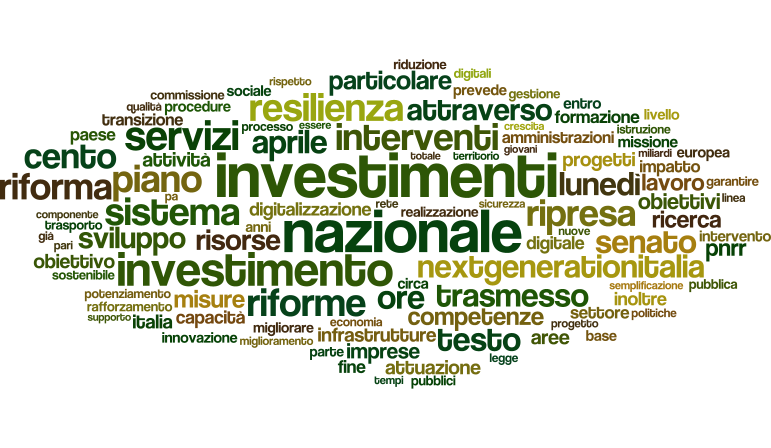Viewed 20067 times | words: 2650
Published on 2021-04-29 20:45:00 | words: 2650

Four days ago, on 2021-04-25, released a A visual journey: from #NextGenerationEU to #PNRR (piano nazionale ripresa e resilienza) to #NextGenerationItalia - part 1
There will obviously a part 2, eventually.
But, for the time being...
...a continuation of a previous thread, started in February 2021, a "signpost" across time about a further milestone in Italy.
Hence, after the previous article in this "thread" released on 2021-02-19, when the new Government Draghi had been introduced, the first item on the table was finalized on 2021-02-26, and approved between 2021-02-26 and 2021-02-27.
I am, obviously, referring to the first phase of the Italian proposals for the allocations associated with #NextGenerationEU, that in Italy is called "Piano Nazionale di Ripresa e Resilienza" (henceforth PNRR), but now also has confirmed its own catch hashtag, #NextGenerationItalia.
First phase, yes.
Because, in my view, the first phase was "preparing a document that reached consensus in Parliament, and therefore can be shared with Brussels".
First phase in a long journey- as this is still, anyway, a framework.
As befits a "signpost", I would like to share just what changed since February, while more details will be in future articles.
Incidentally: as you can see, except the "/2" and the date, the title is the same of the previous "signpost".
Obviously, this is a communication design choice- so that, in the future, it will be possible to just "log" all the "signposts".
The upside of this article? I do not need to share the long disclosure that was a section in the previous article, and can focus just on the same item that I discussed in "/1".
Back then, there were at least few elements, within the section "a short commentary".
The main one was understanding the difference in perception / Weltanschauung between the President of the Council of Ministers (henceforth, PDCM, the Italian acronym), and the political perception of reality.
This time, also because it was focused on a specific element (the 273 pages PNRR), not the whole plan for the new government, the task was easier.
Have a look at the level of alignment between the speech that PDCM Draghi sent to the Camera dei Deputati, and the ensuing debate, and the same at the Senato.

On the left-hand side, the two speeches, on the right-hand side the ensuing debates.
Editing note: on the right-hand side, I removed only the word "presidente", that was quoted so often in both debates to distort the visibility of the other elements.
Content note: have a look at the two tag clouds on the left-hand side.
There is a word that has been highlighted by PDCM Draghi, but not with the same prominence within the two debates: "giovani", i.e. "young".
Both the EU and the Italian hashtags start in the same way, so #NextGenerationEU becomes #NextGenerationItalia.
But the focus of the debate was more on current generations, as usual.
As PDCM Draghi said, this is just the first step on the PNRR- beside the EU funding, there are additional resources that will be provided at the national level, also to follow national requirements and priorities that are not within the "scope" of #NextGenerationEU.
So, there is still hope that both on the governance and implementation the "next generation" side will get higher visibility.
Anyway, if you compare the tag clouds in the previous article with those shown above, you will see a greater degree of convergence.
Yes, I know that a tag cloud is a measure of frequency, not of importance or "connection".
But, in these cases, frequency is also a measure of focus, as the purpose of all the parties involved was to communicate with the other parties.
There is always, in any public speech aiming to obtain consensus, notably in my "tribal" country (Italy), an element of "preaching to the choir".
Which is not shown by the tag cloud, i.e. by the frequency, but just by the mere presence.
It is a routine game: the following day, each "tribe" and each newspaper try to see if some "keyword" that they were expecting is there.
Today I followed an online event organized by the leading Italian business newspaper, "Il Sole 24 Ore", focused on discussing each one of the "missions" within the PNRR.
I do no know if the website will be alive in the future, but it was anyway interesting.
Albeit, for my purposes, the most interesting item was presented at the end- more about this later.
The key element across the day was convergence: both politicians and business representatives converged two elements:
_a need for structural changes
_a need for resilience based on flexibility.
Italy, at least since I started looking at it politically in the late 1970s, and then business-wise first from my (entry level) activities in the early 1980s, then working with senior management since the late 1980s, routinely suffers the side-effects of "heroic efforts".
Whenever there is a crisis, all the focus is on the crisis, and routine delays based on negotiations between tribes are sidelined, joining forces.
But it is more a temporary truce than a systemic effort.
This is the PNRR, as presented by the Government this week:

I would like now to comment two paragraphs from the previous article:
Do we really need to spend 209bln that, in the end, are directly and indirectly loans, when Italian citizens sit on cash and de-facto pay to keep their money on their banking accounts?
It is not a matter of taxation- it is a matter of evolving the "private-public initiative" beyond the corporate confines, and beyond the Cassa Depositi e Prestiti postal savings model.
The new version of the PNRR package actually added a layer of further flexibility by adding national resources, and also the financial sector announced the availability of further resources.
Let's just say that, if the PNRR resources will be invested in sustainable activities that will generate resources and enable both to payback the debt generated since March 2020 and foreseen by the end of this year (today was again quoted the 500bln amount that I shared as my assessment a while ago- if I got it, anybody with a minimum business and social understanding of Italy should have).
A key element that was discussed this morning is: how will the State (and regional and local) bureaucracies cope with the need to allocate a massive amount of funds in a relatively short timespan?
Well, actually, it is almost a mantra, a kind of "What Would Italian Bureaucracies Do" repeated in each speech.
I already expressed my dislike about "cloning" the model adopted to rebuild the Genoa bridge, a kind of "suspended animation" for the legal and regulatory framework.
More interesting proposals on how to accelerate without losing control or enabling infiltration by organized crime have been presented, but I liked this morning a quote from Minister Brunetta presented by former Minister Bassanini, and then partially echoed by former Minister Tremonti.
The quote? That to streamline the Italian Civil Service is not needed a fifth "Grand Plan"- but to implement the previous four.
As for the routine claim that there is a lack of skills in Italy (not just in the public sector), but jobs are available, I would like to share again some data that I observed directly across the decades.
Frankly, in Italy, reminds me of what I saw in the late 1990s, when the demand for Y2K was for those "already skilled".
If companies do not spend on training looking at the future, due to their size and their fear that, if they train people, they will leave...
..."poaching", what many complained about this week, is the only way out.
But if everybody is trying to extract value from somebody else's investment, it is a "first come, first served".
Now what you would need to create sustainable development.
Somebody keeps asking that the State churn out what market demands now.
As there would be no accountability from the demand side, i.e. companies will not have to apply their planning skills, as misallocation will not be their concern on the consequences, e.g. oversupply of obsolete skills when a new "wave" will start, while schools will keep churning out hordes useful for the previous peak.
I will share again an example that I observed first hand, this time in the early 1990s.
For one of my employers, we were looking with people with a degree, to get into project management and methodologies (as I was Head of Training and Methodologies, a business development role coupled with "product development", the product being localization of French and Anglo-American methodologies, training courses, and associated change services).
As a couple of years before had been trendy to launch "direct marketing", also our request for software project management candidates resulted in a pile of CVs showing a degree in direct marketing.
Real specialists, but often their curriculum showed "niche" specialization, and, except for few that sounded more flexible, most specialists, back then as now, reminded me the old saying: if my only tool is the hammer, every problem looks like a nail.
In our times, I think that even for most entry-level jobs, you need to have skills, yes, but also the ability to unlearn, learn, improve, and potentially go cross-domain.
I wrote repeatedly in the past: I have been continuously training since mid-1980s, when I completed high school.
In my case, of course it was relatively easy, as since the late 1980s my roles were of either analysis or coordination, more than being "hands-on".
The latter, if needed, was eventually acquired in each case after a while (be it in business or technology): was just a "bonus" that maybe reused in the future.
As I had to allocate my own funding to that end, beside my permanent curiosity, on the business side focused on what I saw that had a demand, but always considering three planes of reality:
_short-term, i.e. what was in demand in that moment
_medium-term, i.e. what could soon be in demand, as an evolution of what was in demand (even from other domains)
_long-term, i.e. "betting" on what could be needed.
On the latter, the funny part is that, usually, you have to ignore those focused too much on the short-term, as they perceive as a waste anything that is not within their "cone" of visibility.
My experience, both as a "consumer" and "producer" of training curricula and related cultural/organizational change activities?
The short-term side is something that should be solved by the market: only those that have already those skills available can transfer them within a relatively short timeframe, usually on-the-job (remembering that each new team member initially absorbs time from those who already have those skills).
The "medium-term" is something that can be developed through the usual relatively slow approaches, and would make sense to actually have a private-public initiative.
The long-term side is where entrepeneurial risk makes sense: it is a speculative investment.
So, going back to the "giovani" within the speeches delivered by PDCM Draghi, I would actually like to see what happens when the two hundred pages presenting an "outline framework" will turn into something else.
To use old business concepts that you can search online:
_first something akin to a "meta-blueprint", i.e. a blueprint of blueprints, to define, in Go/Weiqi/Baduk concepts, the "boundaries"
_then, a roadmap showing the systemic impacts, as no single "mission" within the PNRR can deliver the desired impact if the other fail.
Changing the educational system in Italy has a long tradition, since the unification of Italy in 1861, and when I was, years ago, reading about that, it was curious, from a cultural and organizational change perspective, how way too often the focus shifted to the short-term type.
Over the last few decades it is quite curious how both State and businesses focused times and again on delivering the skills needed now, and considered less and less useful using the school system to deliver the only ability that requires long-term investment but suffers no obsolescence: learning to learn.
I know that in Italy everybody from the business and political side states always the same information, i.e. that the German Fachhochschule system has 800k students enrolled, while in Italy our ITS (roughly equivalent) have just 20k students.
So, the numbers could grow, but unfortunately way too many (also this week) try to "sell" as "the" solution a tool.
Forgetting that if Germany is importing engineers and specialists, and from job postings I see a large quota of "able to learn" (potential or shown) in requirements, they too have some issues in their school system, that in the past required kids to decide early on which way their academic career would be- going practical now, or having the option to choose a subject later.
Due to the titles harmonization process within the EU, also the Fachhochschule system is evolving- so, it would be better to adapt before adopting.
Maybe, just maybe, because everybody knowns that business models, technologies, processes will continuously change.
I remember attending a dinner/conference in Turin few years ago comparing the various educational systems: pity that the material is not available, would be useful to share with many of those proposing sweeping school system reforms in Italy to "make it closer to the market".
Therefore, from today session on the PNRR, I appreciated the contribution to the closing section, on educational system improvement, delivered by Paolo Dario, Prorettore alla Terza Missione Scuola Superiore Sant'Anna di Pisa, that contained many of the same concepts discussed above, and that I shared also in the past, after attending yet another conference of workshop where the 800k Fachhochschule and 20k/40k ITS figure was shared.
A personal note: it is quite curious as each time I hear a speech from the dean of a leading higher education organization, they talk about low salaries and lower career opportunities as an incentive to "brain drain": neither unsolvable elements, considering the value added in products delivered by Italian companies.
As this is the "citizen audit" side, i.e. focused on data-sharing and highlighting, not on analysis, I will keep my promise- and close the article now.
Anyway, I think that, if you re-read this short article, you will see themes that discussed in the past and that, within the framework of the future implementation of the PNRR, will generate more articles.
So, stay tuned: it will be a long journey, with many "signposts".
 _
_